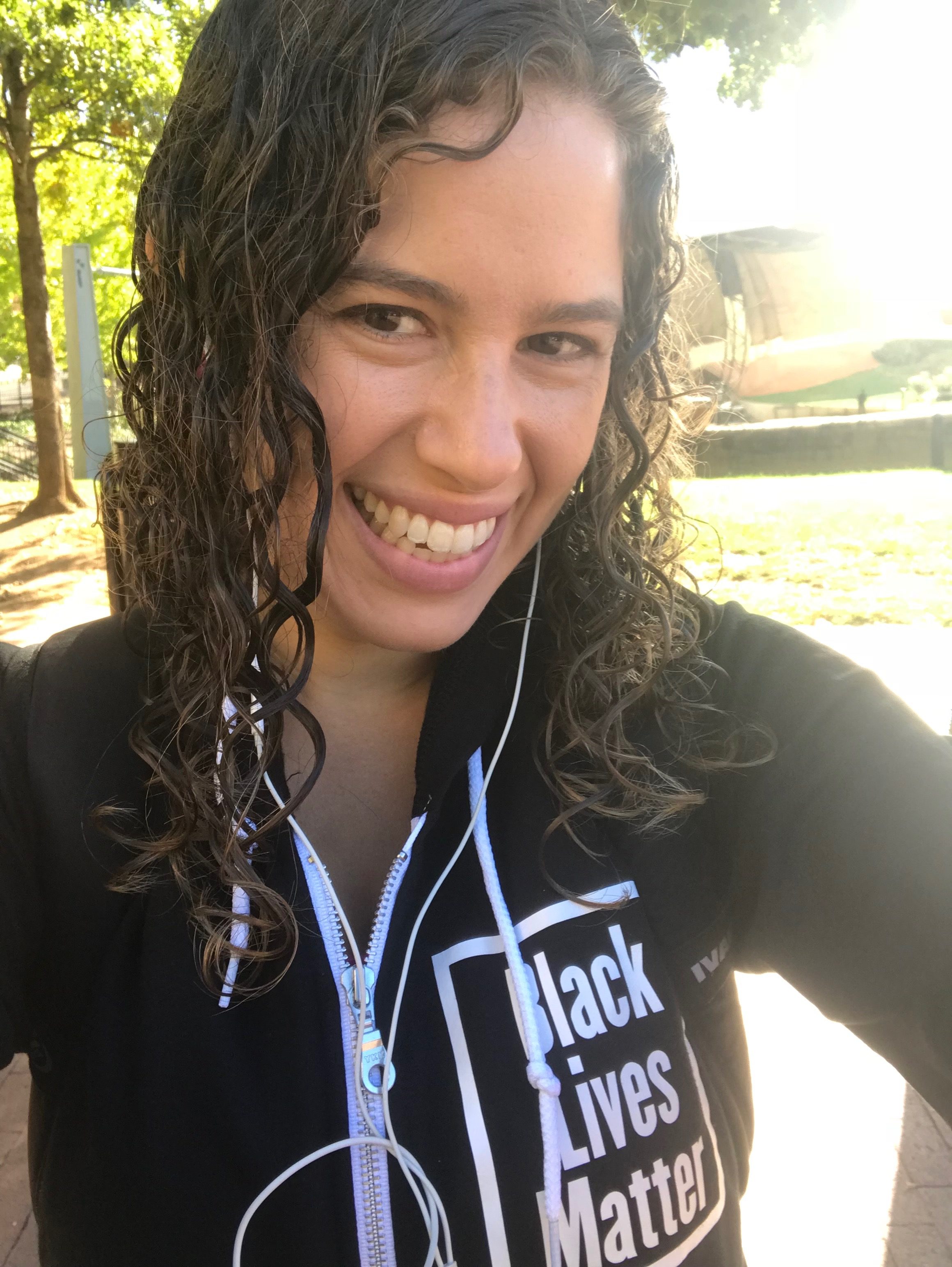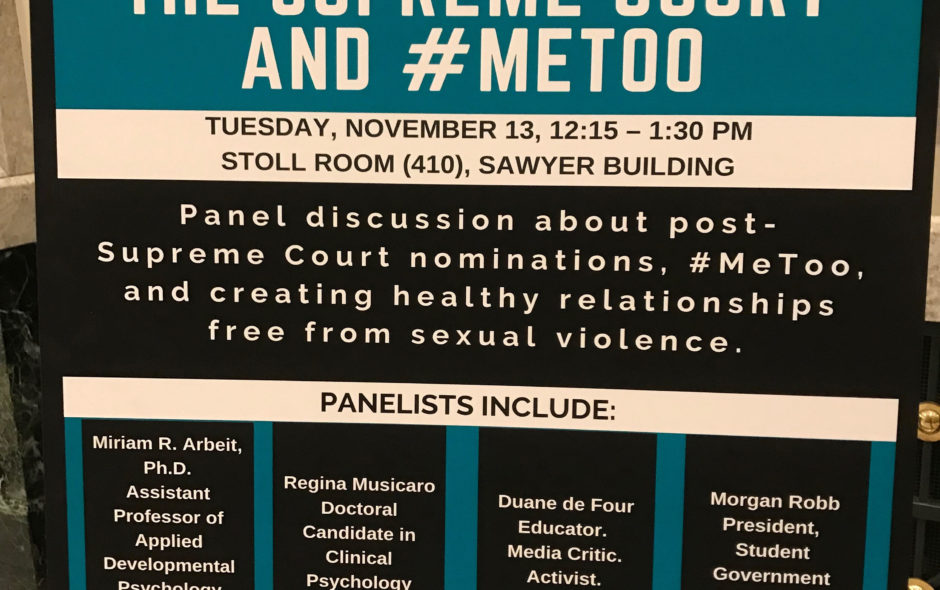Today I was on a panel to discuss sexual violence & the recent Supreme Court confirmation, and I spoke about rape culture, fascism, and survivor-led activism. Thank you Duane DeFour for joining us at Suffolk and for the analysis of perpetrator behavior you brought to the discussion. ***If anything above resonates with you, please make a contribution to the fundraiser I’m doing for Wagatwe Wanjuki, an anti-rape activist who has taught me so much.***
First I want you to know that what happened was wrong. What Christine Blasey-Ford described — the assault against her, as a teenage girl, by the teenage boy she says was the same person the government just gave a lifetime appointment to the US Supreme Court — that was wrong. I’m not a lawyer and the law is not our only arbiter of human behavior. From a developmental perspective, from a moral perspective, attacking someone, restraining them, sexually assaulting them, behaving in such a way that the person being targeted rightly fears death — is wrong. I want everyone in this room to know that. I want every Suffolk student to know that — and every person who has ever attended a party. I want every man to know it. I want every woman and nonbinary person to know it. I want every survivor to know it. It was wrong.
And perhaps, at the same time as knowing that it is wrong, you also know it feels familiar. You know that it happens. You know that this particular scene, of a couple guys isolating and attacking a girl at a party, happens. You know that this kind of thing, this thing that we call sexual assault, happens. You know that it happens to teenage girls in high school. You know that it happens to young women in college. You may or may not know that it’s actually most likely to happen to queer women and trans people. You may or may not know that it happens, too often, to men too. It may or may not have happened to you.
If it has happened to you, I’m sorry. I believe you. And it’s not your fault.
It is, first and foremost, the fault of the person who perpetrated an act of violence against you. And it is, too, the fault of what we call rape culture.
Rape culture is the term we use to name that sexual violence is not a series of isolated events, but rather is a systematic and systemic intentional agenda to use sexual violence as a form of social control.
By saying rape culture is systematic I’m saying it is organized, coordinated, that many different parts of rape culture work together to produce our lives as they are now. By saying rape culture is systemic I’m saying it is pervasive, it is everywhere, it shapes all of us. By saying rape culture is intentional I’m saying it’s on purpose. It is not an accident. It is not an accident that guys at parties isolate and attack their chosen victims. It is not an accident that other guys at parties don’t stop them. It is not an accident when the cops don’t stop them. It is not an accident when they are not punished.
Rape culture is on purpose because it serves a purpose, and we cannot be fully effective at stopping rape culture unless we are also ready to admit and address the purpose it serves. Rape culture is a systematic and systemic intentional agenda to use sexual violence as a form of social control of women and queer people in the service of White Supremacy.
Rape culture upholds White Supremacy, and White Supremacy relies on rape culture. The work of ending rape is also the work of dismantling white supremacy. And, right now, with utmost urgency, the work of dismantling white supremacy is also the work of stopping white supremacist fascism.
My disciplinary training as a developmental psychologist is about understanding human development as ongoing mutual influences between the individual and context. I will anchor us in an analysis of the current developmental context in which we operate, and then I will affirm the power of individual agency in making much-needed change.
The context in which we develop, in which we are currently developing — is constituted and constrained by historical time and place. One of the defining features of our current historical time and place is the sharp rise of white supremacist fascist ideology & action.
Rape culture, sexual violence, and men’s violence against women are core components of the white supremacist fascism on the rise across America.
- Some white supremacist factions have rape culture and men’s entitlement to women’s lives and bodies as their core defining feature — this includes the men who call themselves Men’s Rights Activists, as well as the men who call themselves involuntary celibates. As if women owe them anything.
- Some white supremacist factions rely on rape culture as a rhetorical threat to distract you from their real agenda. When the fascists claim that Mexican men will rape us, they don’t actually care if we are raped or not. They just want us to fear Mexicans. We won’t give in to that false fear. When the fascist claim that affirming the right of trans people to use the bathroom that makes them most comfortable will give cis male predators an excuse to enter the women’s bathroom to rape us, they don’t actually care if we are raped or not. They just want us to fear a society that affirms the existence of trans people. We won’t give in to that false fear. It is rape culture and white supremacist culture that damage our personal and interpersonal development — not communities that affirm and protect trans people and immigrants. Communities that affirm and protect trans people and immigrants are good for us all.
- Some white supremacist factions rely on rape culture inherent to centuries of white supremacy on this continent, meaning the ways in which White male colonizers use sexual violence to attack and abuse Native Peoples, and the ways in which White male capitalists use sexual violence to control, profit off, and abuse Black enslaved people. When we fight to end sexual violence on these lands, we must first and foremost fight to end sexual violence against Black and Indigenous women — abuse which continues to this day.
- And while in some ways these white supremacist factions are distinct, they are not entirely separate either. The giant violent white supremacist attack on Charlottesville, Virginia in 2017 was called quote “Unite the Right,” and that was one of many attempts to do so. The fascists are racist and Islamophobic and xenophobic and transphobic and homophobic and anti-semitic and they are also very, very sexist rape apologist perpetuators of rape culture.
- So, that is where we are. This is the world we are living in. A world in which 1 in 4 girls and 1 in 6 boys are sexually abused before the age of 18. That means many of us in this room were survivors before we even came to Suffolk. I’m sorry, I believe you, and it is not your fault.
It is not your fault, and yet it is now a part of your life, a part of your development, a trauma for you to process and survive and respond to in whatever ways you choose. So before I close, as promised I want to talk about individual agency. I want to talk about the role of survivor-activism in bringing about much-needed change, to end rape culture, to dismantle white supremacy, and to stop fascism in its tracks.
I’m grateful for the people who went to DC to put their bodies on the line in solidarity with Christine Blasey-Ford and in protest of confirming a lifetime appointment on the Supreme Court for a man who has testimony against him as a perpetrator of sexual assault. What was the purpose of these protests and what did these activists do for us?
- The most ambitious goal was, of course, to stop the confirmation. Making the hearings as uncomfortable as possible, making the voting elected officials as uncomfortable as possible, and swaying public opinion all had the potential to stop the confirmation. Even though that did not happen, the activism itself is still worthwhile.
- For years, the Movement for Black Lives has called on us to disrupt business as usual. Do not let a violent exploitative system operate with ease. Do not quietly continue with a consistently harmful status quo. Disrupting business as usual is thus another important purpose of protest.
- The activists attempting to stop the confirmation and disrupt business as usual were also doing something specifically for us. They were holding space for us, holding space for survivors to know that someone thinks this is wrong and cares enough to do something. I was here teaching classes at Suffolk and did not go to DC, and I’m grateful to those who went and held this space for me.
- The activists were also in DC specifically to honor the testimony of Christine Blasey-Ford and the testimony of Anita Hill before her. Holding up and honoring the precedent of Anita Hill’s testimony is important. White feminists and white survivors, myself included, must remember with every word and every action that the history of survivor-led activism is a history of leadership by Black women and women of color.
- So when we honor the survivor-led activism in DC, we must honor the entire history of women of color survivor-led anti-rape activism. Centuries of history that includes Kimberle Crenshaw and Anita Hill and Tarana Burke and Ericka Hart, as well as people who launched their activism as students, speaking up about college sexual violence, like Wagatwe Wanjuki and Emma Sulkowicz.
Rape culture and white supremacy are terrible terrifying defining developmental features of our time. And. So are we. We are also defining developmental features of our time. We have agency. We can fight back.
So, to survivors: I believe you, and I believe in you. I believe in your power and I believe in your ability to take action. Thank you.
***If anything above resonates with you, please make a contribution to the fundraiser I’m doing for Wagatwe Wanjuki, an anti-rape activist who has taught me so much.***

